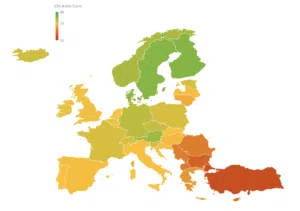Brussels – The report released today (Jan. 25) by the Sustainable
Development Solutions Network, the UN-created network of experts to monitor the
implementation of the 17 Sustainable Development Goals, is not reassuring
(SDGs). The Europe Sustainable Development Report 2023/24, now in its fifth edition, shows that among the 38 EU, Efta, and EU candidate countries “there is progress, but not at the rate required and with inequalities that remain unresolved.” That’s how Sustainable Development Solutions Network Vice President Guillaume Lafortune summarizes the situation on the continent in light of the new report, speaking to a small pool of European journalists—including Eunews—during a meeting at the headquarters of the European Economic and Social Committee (EESC) in Brussels.

“This is a diagnostic tool, an independent mirror of the situation in Europe,” Lafortune explains, warning that “we need to focus especially on the social aspects.” Alongside him, the president of the Agriculture, Rural Development and Environment (Nat) section of the EESC, Peter Schmidt, agrees wholeheartedly: “We consider this report to be one of the most important for monitoring progress on the 2030 Agenda; it doesn’t seem that policymakers have really understood where we need to get to.” Among the most problematic aspects are especially the social ones, where the lack of significant progress—if not stagnation or regression—to reduce inequality, “risks leading to a point where people will no longer follow” the 2030 Agenda of Sustainable Development Goals. A preview of this scenario is provided by the farmers’ protests that, from the Netherlands to Germany, from France to Brussels, “are demonstrating this risk,” Schmidt warns. Social issues tie in with environmental ones, given the difficulties even on climate goals: “If you set targets, but you don’t change the way you do policy and the economic model, you can’t achieve them.”
It is for this reason that EESC, in collaboration with the Sustainable Development Solutions Network, has come up with 10 essential priorities for EU institutions ahead of the next legislative term kicking off after the June 6-9 European elections. “In June 2024, citizens will not only elect the new European Parliament and set the course for the formation of the next European Commission, but they will also draw the foundations for the future of the EU and its global role into the next decade,” reads the joint statement provided to the press, which calls campaigning political parties and future EU leaders to their “historic responsibilities.” In particular, this involves “taking decisive action before 2030” to avoid “irreversible environmental and social tipping points” and to “maintain the possibility of achieving global goals,” including the Sustainable Development Goals Agenda.
 “At the halfway point, none of the 17 Sustainable Development Goals is on track to be achieved globally by 2030, 85 per cent are either declining or showing minimal progress,” is the warning introducing the “10 priority actions for this European Deal for the Future” addressed to all political parties, the upcoming EU Parliament and Commission, the European Council and member states. First and foremost is the need to significantly reduce the risk of poverty and social exclusion of European citizens, and to redouble efforts to achieve zero emissions in the EU by 2050, “with major progress by 2030.” Regional and local authorities in Europe must be strengthened in achieving the sustainable development goals and the transformation “towards a sustainable trading system” must be supported.
“At the halfway point, none of the 17 Sustainable Development Goals is on track to be achieved globally by 2030, 85 per cent are either declining or showing minimal progress,” is the warning introducing the “10 priority actions for this European Deal for the Future” addressed to all political parties, the upcoming EU Parliament and Commission, the European Council and member states. First and foremost is the need to significantly reduce the risk of poverty and social exclusion of European citizens, and to redouble efforts to achieve zero emissions in the EU by 2050, “with major progress by 2030.” Regional and local authorities in Europe must be strengthened in achieving the sustainable development goals and the transformation “towards a sustainable trading system” must be supported.
Diplomacy on sustainable development goals will be leveraged through Team Europe and the UN format, strengthening Europe’s “multilateral role” in reforming the global financial architecture and refocusing EU international partnerships “toward mutually transformative cooperation.” Financial means should be mobilized for transformations for a sustainable future and the integration of SDGs institutionalized” into strategic planning, macroeconomic coordination, budget processes, research and innovation missions, and other policy instruments.” Lastly, it calls for the establishment of “new permanent mechanisms for structured and meaningful engagement” both within the European Parliament and with civil society, “including young people”.
English version by the Translation Service of Withub



